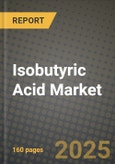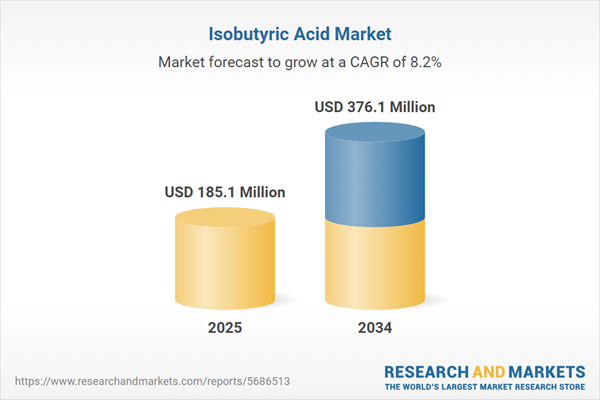Isobutyric Acid Market
Isobutyric acid is a branched short‑chain carboxylic acid widely used as a chemical intermediate in diverse industries including flavours & fragrances, pharmaceuticals, agrochemicals, food & feed additives and specialty chemicals. Its application footprint spans manufacturing of esters for fragrance compounds, intermediates for active pharmaceutical ingredients (APIs), feed‑additive growth promoters in animal nutrition, and chemical building blocks in coatings, adhesives and plastics. Recent trends indicate an increasing shift toward bio‑based or renewable manufacturing routes of isobutyric acid (driven by sustainability agendas), growing veterinary/animal‑feed use in emerging markets, and heightened demand from pharmaceutical/ speciality chemical supply‑chains seeking versatile intermediates. Growth drivers include expansion of global animal‑protein production (boosting animal‑feed additives), growth in personal‑care and fragrance markets (raising ester intermediates demand), and rising pharmaceutical production in emerging regions (increasing demand for API‑intermediates). On the supply side the landscape features both established chemical producers and niche specialty‑intermediate players; key dynamics include feedstock cost volatility (propylene, hydrocarbons or biomass), regulatory and environmental compliance burdens (especially for synthetic chemical routes), and substitution risk from alternative chemistries or more cost‑effective intermediates. Overall, the isobutyric acid market is poised for above‑average growth over the next 5‑10 years, albeit from a modest base, and will be increasingly shaped by sustainability, manufacturing localisation and application diversification.Isobutyric Acid Market Key Insights
- Feed additive growth accelerating - Use of isobutyric acid in animal feed as a growth promoter and digestive enhancer is increasing, especially in regions with rising livestock/ poultry production.
- Fragrance & flavour intermediates remain pivotal - Isobutyric acid’s role in esterification for fragrance and flavour compounds continues to drive demand in personal care and food industries.
- Pharmaceutical & speciality chemical applications gaining share - The acid is a building block for APIs and agrochemical intermediates, connecting to growth in global pharma and agro sectors.
- Transition to renewable/bio based production - Sustainability pressures are prompting bio based isobutyric acid routes (e.g., from biomass) which could enhance market growth and premium positioning.
- Emerging markets offer high growth potential - Regions such as Asia Pacific and Latin America, with rising industrialisation, animal protein demand and chemical manufacturing, present strong upside.
- Feedstock and cost constraints persist - Volatile costs of feedstock (hydrocarbons or biomass) and the complexity of production pose barriers to margin expansion and new entrants.
- Regulatory/environmental pressures increasing - Stringent chemical manufacturing, emissions and residues regulations are adding cost and innovational pressure for producers of isobutyric acid.
- Substitution risk exists - In lower cost or less demanding applications, alternative acids or intermediates may supplant isobutyric acid if cost/benefit trade offs favour them.
- Grade differentiation matters - Industrial grade versus reagent/pharmaceutical grade variants carry different value and growth dynamics; premium grades offer higher margins.
- Regional supply chain localisation becoming strategic - Manufacturers are increasingly investing in local production capacities or closer logistics to reduce dependency on long supply chains and to serve regional growth markets faster.
Isobutyric Acid Market Reginal Analysis
North America
The region is underpinned by a mature industrial base (chemicals, pharmaceuticals, feed additives) and relatively advanced regulatory/certification frameworks. Demand growth is steady, driven by pharmaceutical intermediates and feed‑additives, though cost pressures and feedstock constraints moderate pace.Europe
Europe features moderate growth supported by strong fragrance & flavour manufacturing, animal‑nutrition regulation and sustainability‑driven chemical policies. However, high production costs, stringent environmental standards and substitution threats constrain faster expansion.Asia‑Pacific
This is the fastest‑growing region for isobutyric acid. Rapid expansion of feed‑animal production, growth in personal‑care and food sectors, and increasing chemical‑intermediate manufacturing (in China, India and Southeast Asia) drive demand. Challenges include feedstock volatility, quality control and local competition.Middle East & Africa
Adoption is nascent but rising, especially where agricultural/animal‑feed growth is strong and chemical‑intermediate demand is expanding. However, weaker local manufacturing, import dependencies and infrastructure/logistics issues slow acceleration.South & Central America
Growth is incremental in Latin America, propelled by rising meat/ poultry consumption, growing fragrance/food‑industry activity and expanding chemicals manufacturing. Yet economic volatility, elevated import costs and less mature specialised‑chemical supply chains limit rapid scale‑up.Isobutyric Acid Market Segmentation
By Grade
- Reagent Grade
- Industrial Grade
By Purity
- More than 98%
- Less than 98%
By Type
- Synthetic Isobutyric Acid
- Renewable Isobutyric Acid
By End-User
- Animal Feed
- Food & Flavor
- Chemical Intermediate
- Pharmaceutical
- Others
Key Market players
OQ Chemicals (Oxea), Eastman, BASF, Perstorp, Mitsubishi Chemical, KH Neochem, INEOS, Zhejiang Realsun Chemical, Yancheng Hongtai Bio-Engineering, Shanghai Jahwa Chemical, Alfa Aesar (Thermo Fisher), Tokyo Chemical Industry (TCI), Celanese, Godavari Biorefineries, Zhonglan IndustryIsobutyric Acid Market Analytics
The report employs rigorous tools, including Porter’s Five Forces, value chain mapping, and scenario-based modelling, to assess supply-demand dynamics. Cross-sector influences from parent, derived, and substitute markets are evaluated to identify risks and opportunities. Trade and pricing analytics provide an up-to-date view of international flows, including leading exporters, importers, and regional price trends.Macroeconomic indicators, policy frameworks such as carbon pricing and energy security strategies, and evolving consumer behaviour are considered in forecasting scenarios. Recent deal flows, partnerships, and technology innovations are incorporated to assess their impact on future market performance.
Isobutyric Acid Market Competitive Intelligence
The competitive landscape is mapped through proprietary frameworks, profiling leading companies with details on business models, product portfolios, financial performance, and strategic initiatives. Key developments such as mergers & acquisitions, technology collaborations, investment inflows, and regional expansions are analyzed for their competitive impact. The report also identifies emerging players and innovative startups contributing to market disruption.Regional insights highlight the most promising investment destinations, regulatory landscapes, and evolving partnerships across energy and industrial corridors.
Countries Covered
- North America - Isobutyric Acid market data and outlook to 2034
- United States
- Canada
- Mexico
- Europe - Isobutyric Acid market data and outlook to 2034
- Germany
- United Kingdom
- France
- Italy
- Spain
- BeNeLux
- Russia
- Sweden
- Asia-Pacific - Isobutyric Acid market data and outlook to 2034
- China
- Japan
- India
- South Korea
- Australia
- Indonesia
- Malaysia
- Vietnam
- Middle East and Africa - Isobutyric Acid market data and outlook to 2034
- Saudi Arabia
- South Africa
- Iran
- UAE
- Egypt
- South and Central America - Isobutyric Acid market data and outlook to 2034
- Brazil
- Argentina
- Chile
- Peru
Research Methodology
This study combines primary inputs from industry experts across the Isobutyric Acid value chain with secondary data from associations, government publications, trade databases, and company disclosures. Proprietary modeling techniques, including data triangulation, statistical correlation, and scenario planning, are applied to deliver reliable market sizing and forecasting.Key Questions Addressed
- What is the current and forecast market size of the Isobutyric Acid industry at global, regional, and country levels?
- Which types, applications, and technologies present the highest growth potential?
- How are supply chains adapting to geopolitical and economic shocks?
- What role do policy frameworks, trade flows, and sustainability targets play in shaping demand?
- Who are the leading players, and how are their strategies evolving in the face of global uncertainty?
- Which regional “hotspots” and customer segments will outpace the market, and what go-to-market and partnership models best support entry and expansion?
- Where are the most investable opportunities - across technology roadmaps, sustainability-linked innovation, and M&A - and what is the best segment to invest over the next 3-5 years?
Your Key Takeaways from the Isobutyric Acid Market Report
- Global Isobutyric Acid market size and growth projections (CAGR), 2024-2034
- Impact of Russia-Ukraine, Israel-Palestine, and Hamas conflicts on Isobutyric Acid trade, costs, and supply chains
- Isobutyric Acid market size, share, and outlook across 5 regions and 27 countries, 2023-2034
- Isobutyric Acid market size, CAGR, and market share of key products, applications, and end-user verticals, 2023-2034
- Short- and long-term Isobutyric Acid market trends, drivers, restraints, and opportunities
- Porter’s Five Forces analysis, technological developments, and Isobutyric Acid supply chain analysis
- Isobutyric Acid trade analysis, Isobutyric Acid market price analysis, and Isobutyric Acid supply/demand dynamics
- Profiles of 5 leading companies - overview, key strategies, financials, and products
- Latest Isobutyric Acid market news and developments
Additional Support
With the purchase of this report, you will receive:- An updated PDF report and an MS Excel data workbook containing all market tables and figures for easy analysis.
- 7-day post-sale analyst support for clarifications and in-scope supplementary data, ensuring the deliverable aligns precisely with your requirements.
- Complimentary report update to incorporate the latest available data and the impact of recent market developments.
This product will be delivered within 1-3 business days.
Table of Contents
Companies Mentioned
- OQ Chemicals (Oxea)
- Eastman
- BASF
- Perstorp
- Mitsubishi Chemical
- KH Neochem
- INEOS
- Zhejiang Realsun Chemical
- Yancheng Hongtai Bio-Engineering
- Shanghai Jahwa Chemical
- Alfa Aesar (Thermo Fisher)
- Tokyo Chemical Industry (TCI)
- Celanese
- Godavari Biorefineries
- Zhonglan Industry
Table Information
| Report Attribute | Details |
|---|---|
| No. of Pages | 160 |
| Published | November 2025 |
| Forecast Period | 2025 - 2034 |
| Estimated Market Value ( USD | $ 185.1 Million |
| Forecasted Market Value ( USD | $ 376.1 Million |
| Compound Annual Growth Rate | 8.2% |
| Regions Covered | Global |
| No. of Companies Mentioned | 15 |









